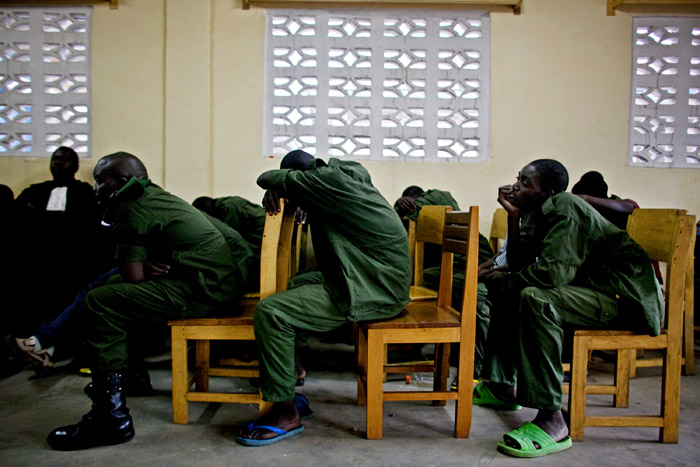
Impunity has plagued the Democratic Republic of Congo for decades, particularly in the east. Citizens and government officials have recently taken action to address the lack of justice for human rights violations committed in the Congo since 1990, including specific abuses described in the 2010 U.N. Mapping Report. Representatives of Congolese civil society organizations from all 10 provinces and Kinshasa, international civil society organizations, government officials, and diplomats, hosted by Human Rights Watch and the Congolese Coalition for Transitional Justice, met in Goma earlier this month to discuss the creation of a mixed court system.
Initially, participants discussed a proposed “mixed chambers” justice model that would operate within existing Congolese courts to try perpetrators of grave human rights abuses. However, after discussing the need for court autonomy and the lack of existing Congolese judicial infrastructure, a “mixed court” approach was adopted. The mixed court model allows for the court to operate under the Congolese judicial system, while maintaining autonomy and judges’ independence with its own infrastructure and logistics. The “mixed” aspect of the court is the combination of both Congolese and non-Congolese experts, with the goal being to build capacity within the country and eventually phase out international staff.
During the Goma conference, 34 Congolese and international civil society groups signed a common position that welcomed the Congolese government’s draft legislation on the establishment of a mixed court. They wrote:
…Our organizations are convinced that the establishment of a specialized mixed court to prosecute these crimes [the most serious international crimes committed on Congolese soil since 1990] has the potential to help put an end to impunity, to improve victims' access to justice, and to strengthen more generally the national judicial system's capacity and willingness to effectively prosecute the most serious international crimes…
However, to ensure that the mixed court is “truly independent, effective, credible, and able to meet the high expectations of justice for victims of atrocities in the DRC,” the groups also called for amendments to the proposed bill.
The draft legislation proposes that the specialized mixed court’s jurisdiction should only cover crimes committed from 1990 to 2003. The organizations recommended taking this a step further, arguing that for the court to truly tackle impunity—as well as strengthen the Congolese national judicial system—its jurisdiction must also include crimes committed after 2003 that the International Criminal Court are not already addressing.
The civil society groups also advocated for a positive dynamic between the mixed court and ordinary Congolese courts in order to try the greatest number of cases. It argues that the mixed court should focus on perpetrators responsible at the highest levels, giving the mixed court primary but not exclusive jurisdiction over the crimes it addresses. They suggested that the draft legislation should provide that cases not seen by the mixed court should then be referred to ordinary Congolese courts.
The organizations also focused on the role and rights for victims of the mixed court. They proposed an amendment that would establish a specialized victims and witnesses unit, which would be responsible for physical and psychological protection. Additionally, they suggested the bill should include the establishment of a victims’ reparations fund.
Following the conference on April 13, several civil society representatives presented the common position to Minister of Justice and Human Rights Luzolo Bambi. According to Human Rights Watch, Bambi has indicated that the draft bill will be introduced during the current session of Parliament, which ends on June 15. Moving forward, the civil society organizations have promised to be “watching closely” to ensure that the mixed court that is established is truly independent, effective, and credible.
Photo: Soldiers in a makeshift courtroom (AP)

